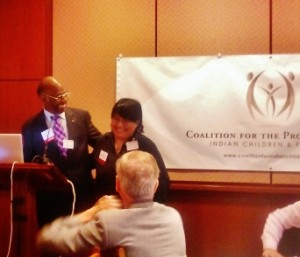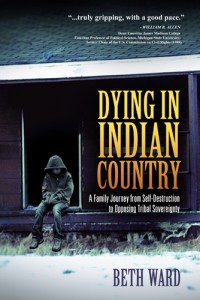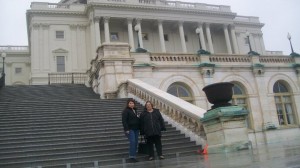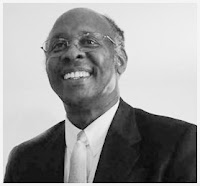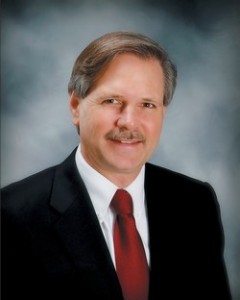Washington DC Teach-In:
The goal of our meetings throughout the week in DC was to let people know what we are about and to invite them to the
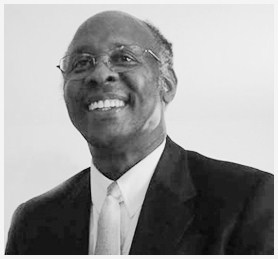
Dr. William B. Allen
Teach-in on Friday. We had wonderful speakers lined up for the event, including a mom who is on the verge of losing her daughter – a little girl of LESS than 1% heritage.
After years of practice, we’ve finally figured out that taking four days to visit Congressional offices is way to go. Monday, we focused on the Hart building, with some in Dirksen. Tuesday, Rayburn. Wednesday, Russell and Dirksen, and Thursday, Cannon and Longworth. LOTS less running around and back and forth, and we were able to take time to bop into various extra offices in between the scheduled meetings. We’ll make this into a science yet – (well, I suppose it was already made into an art by lobbyists long ago)
Sarah and I had four meetings scheduled the first day, Monday. While listing names and associations might seem dull, I want to give you all the information so you can make personal decisions about whether or not to contact someone. If you would like me to write more about my poor choice in motel, having to spend $30 in taxi fees a day just to get to a Metro station, or what it is like to ride the underground metro after the taxi driver letting you off tells you that he would never allow his mother to wait at this particular station alone, just let me know.
We began our day with Kawe Mossman-Saafi in Senator Inouye’s office. Senator Inouye (Hawaii) is on the Senate Committee on Indian Affairs (SCIA) as well as the ‘adoption caucus’ – the Congressional Coalition on Adoption (CCA). The meeting with Ms. Mossman-Saafi went well. She had been unaware of these things happening to children under the Indian Child Welfare Act, was very kind and interested, and agreed something needs to be done.
We next met with Kathryn Hitch in Senator Crapo’s office (Idaho), who is also on the SCIA. This meeting also went well and she told us she would be coming to the teach-in on Friday.
We had a little time before the next meeting, so we dropped into Senator Bingaman’s office and visited with Casey O’Neil. If you live in New Mexico, please call him and tell him about ICWA. He was very nice but needs some help understanding the issue.
Jayne Davis was the aide for Senator Conrad, ND. (SCIA & CCA) She read up on us before hand and had a good idea of why we were there. She was very friendly and agreed to come on Friday.
We thought we had good meeting with Kenneth Martin and Sarah Butrum in South Dakota Senator Tim Johnson’s office (SCIA & CCA). Although he said there is no stomach in Congress to change ICWA, he assured us that either he or his aide, Sarah, would be at the Teach-in on Friday.
That day we also made unscheduled visits to the offices of Senator Akaka (SCIA & CCA), Lieberman (CCA), Rubio, Barrasso (SCIA), Murkowski (SCIA & CCA), and Franken (SCIA).
The aide for Senator Barrasso (WY),Travis McNiven, was extremely friendly and surprisingly apologetic. He said he had intended to get hold of us for an appointment but hadn’t had a chance. He was glad that we had stopped in and asked us to send him a legislative draft, which I did when I got back to the motel that evening. Senator Rubio’s aide, Jonathan Baselice was also very friendly.
In all, we went to eleven offices on Monday. At a few of the unscheduled visits, there was no aide to meet with so we briefly explained that the Teach-in is an opportunity to discuss the ICWA problems as a community, and then left some information and an invitation to the event.
We started Tuesday meeting with Michele Bachmann’s staff at 10am. Rep. Bachmann’s office is extremely supportive of our efforts and has said they will co-sponsor legislation that will protect children better. Katie Poedtke was our contact this day, and gave us the list of members of the adoption caucus (CCA), which was great to use for unscheduled visits. Rep. Bachmann co-chairs the CCA. She is not, however, on the House Subcommittee on Indian/Alaskan Native Affairs (SIANA)
We stopped in at offices for Rep’s Don Young (SIANA), Denny Rehberg, Dan Boren (SIANA), Dale Kildee (SIANA), Ed Markey (SIANA) and Jim Sensenbrenner (CCA).
On Wednesday it was back to the Senate offices. This was our day to meet with Senator Hoeven’s staff. They had been very helpful in assisting us to set up the Teach-in and were very attentive during our this meeting. Deputy Chief of Staff Ryan Bernstein asked several very good questions about ICWA. Sara Egeland, our contact for setting up the Teach-in, was also at there.
Unscheduled visits included Senator’s Burr (CCA), McCain (SCIA & CCA), Snowe (CCA), Blunt (CCA), Rand Paul, and John Thune (CCA). Per the request of one mom, we made sure to drop a packet of letters for her Senator, Jim DeMint (SC). He is also a member of the CCA. I was able to meet with Senator Inhofe’s aide, Ellen Brown, briefly. Senator Inhofe (OK) is another co-chair to the CCA. Ms. Brown was very nice, as was John Zimmer from Senator Mike Johanns’ office (NE) (SCIA).
The one that surprised me the most was Jackie Parker, from Senator Carl Levin’s office. (MI) (CCA). She was very glad we dropped in but was in a hurry to another meeting, so asked me to walk with her and tell her more about the issue. She wants to stay in contact and asked for ideas and potential tweeks to the law.
Senator Coburn’s Chief of Staff, Mike Schwartz was incredibly welcoming. He remembered us from our visit in 2007 and was still just as supportive. Mr. Schwartz urged us to visit Senator Landrieu’s office as well. He said that not only is she a co-chair for the CCA, she is a wonderful person and a good friend of his. I stopped by her office and picked up contact information for a couple of her aides.
One of our Mom’s flew in Wednesday night with her son. Debra had lost a 2-year old to ICWA a few years ago. So we started Thursday with a meeting with her Senator, Maria Cantwell. (WA) (SCIA). Senator Cantwell’s aide, Paul Wolfe, was wonderful and we look forward to corresponding with him more.
We then visited with Todd Ungerecht, an aide to a Representative from Debra’s State. Rep. Doc Hastings (WA) is the Chair to the Natural Resource Committee, which the House Indian Affairs is a subcommittee of. He was very good to meet with.
At this point, Sarah took Debra and her son sight seeing, and I went on to my Representative’s office, Rick Berg. There I met with Danielle Janowski. Rep. Berg’s office has got to be the one most on the ball on Capitol Hill, because they had a Thank You card already in my mailbox by the time I got home.
While waiting for another parent, Johnston Moore, to arrive for a meeting with his Representative, I dropped into as many additional offices as I could, including the offices for Rep’s Benishek (SIANA), Gosar (SIANA), Flake, Thompson, Hunter, Denham (SIANA), Lujan (SIANA), Hanabusa (SIANA), and Speaker John Boehner. I simply explained that we wanted to start a conversation about what is happening to children and families affected by ICWA as well as leave some information.
The staff person for Representative Kristi Noem of South Dakota was not as welcoming this time as she had been last January. She basically told me that pushing for a change in the ICWA right now would be too difficult. I was very disappointed as their office had seemed so helpful the last time we had been there. It is important for us (especially families from South Dakota) to continue speaking to Rep. Noem about this as she is on the SIANA. It could be that the NPR series on ICWA, which aired the very week we were in DC and was very condemning of South Dakota’s foster care system, has frightened them.
We had good meetings in the offices of Raul Labrador (SIANA), Tom McClintock (SIANA), and an interesting one in the office of Karen Bass (Co-chair of the CCA).
By Thursday evening, we had visited the offices of every member of the Senate Committee on Indian Affairs, every member of the House Committee on Indian Affairs, and many of the members of the adoption caucus. I went in to several additional offices as well, just to tell the front desk about the Teach-in, why we are having it, and inviting members of their staff to come – especially if I thought that particular Congressman had a heart for the Constitution.
Now the five of us walked a couple blocks to one of our favorite restaurants, a deli called “Cosi,” and enjoyed getting to know each other a little better. We’ve spent years talking on the phone and had never before met face-to-face.
Waiting for the taxi to come to take us to Capitol Hill the next morning – my stomach was tied up in knots. “Lord Jesus, please be with us as we speak and interact with our guests. Help us to remember that this is all about you – not about us – and all we want is what You want – to care for the children. Lord, in the name of Jesus, please help us to speak as we ought to speak, with wisdom and grace… Amen”
Friday’s presentation was wonderful. The information given by Dr. Allen, Yale Lewis, Johnston Moore, and the mothers who came to tell their stories, Debra and Melanie, was incredible. I can’t say enough about the compelling effort and testimony given. Please keep Melanie and her family in prayer right now.
Congressman Tim Scott from South Carolina, Senator Hoeven from North Dakota, Congressman Faleomavaega from American Samoa, and Congresswoman Michele Bachmann of Minnesota all sent staff to attend the event. Jayne Davis from Senator Conrad of North Dakota also attended for a short time. A representative from a national adoption council also attended and was very interested.
There were certain Legislative Aides who were quite interested during meetings earlier this week who had already told us they would be unable to attend. Senator Barrasso’s office, Senator Levin’s office, Senator Inhofe’s office, and Senator Tom Coburn’s office, in particular.
While disappointed in the low turnout, the message was phenomenal and we look forward to sharing portions of the video tape. People who hear the stories are always surprised this is happening to children and supportive of efforts to ensure their best interest. To get the attention of Congress, the rest of America needs to know what is happening. We are discussing ways to use the video tape to get the story out.
We have begun posting portions to YouTube. We also want to make a short version for use in churches and speaking events. The wrap up by Dr. Allen is particularly incredible. If you would like to share the video or portions of it in your area, please let us know. You might be able to decide better after we get a couple more things up on YouTube. Again – if there is anyone that is able to help with this type of thing, we embrace volunteers.







